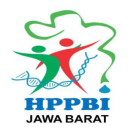Science Process Skills (SPS) Biology Education Students in Histology Practicum Eye Epithelial Tissue Material
DOI:
https://doi.org/10.37150/rebion.v2i2.1391Abstract
Background: Science process skills (SPS) can be trained to students to meet the demands of learning science based on the nature of science through practical activities. This study aims to determine whether there is an effect of science process skills on students' conceptual mastery of biology education students on histology practicum on epithelial tissue material. Methods: This research was conducted using a descriptive method. The sample used in this study was 40 students. Students carry out learning activities with practicum methods accompanied by assistants and practicum supervisors. Determination of research subjects with random sampling technique. The research instrument used consisted of a Science Process Skills (SPS) observation sheet covering four aspects, namely observation, classification, hypothesis, and communication, while the science process skills test scores were taken from the post-test results. The observation sheet analysis technique that will be assessed is the aspect of science process skills in the form of a checklist method. Results: Based on the post-test results of biology education students who participated in the histology practicum on connective tissue material, it appears that the average score achieved is a good percentage of 52.5%, meaning that the histology material conceptually can be understood well by students. Conclusion: the most dominant histology practicum of epithelial tissue material is classifying skills by 78% with good category, observing and communicating skills also have good criteria, respectively 68% classification and 50% for communication, while the sufficient category is 45% owned by hypothesis skills
Keywords : learning; experiment; think critically; integrated; observation
Downloads
Published
How to Cite
Issue
Section
License
Copyright (c) 2021 Report of Biological Education

This work is licensed under a Creative Commons Attribution-NonCommercial-ShareAlike 4.0 International License.










